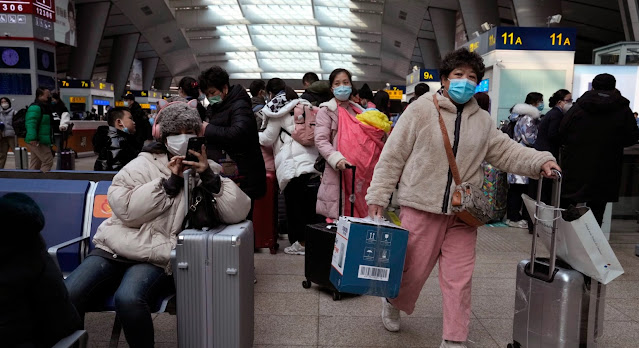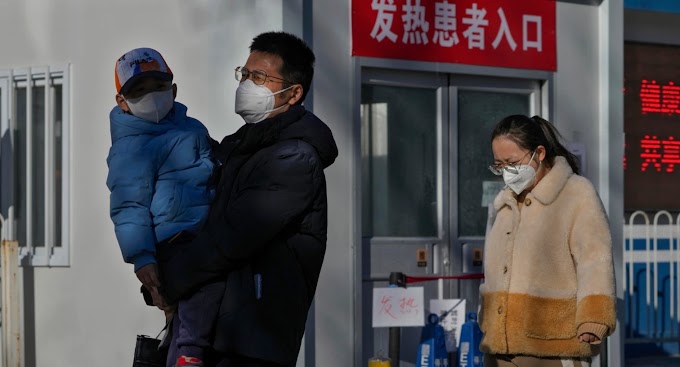The medical system cannot cope with the revenge return to the hometown during the Spring Festival, and the epidemic may explode in rural China.
 |
| Passengers wearing face masks wait in the waiting room of Beijing South Railway Station. (January 14, 2022) |
HONGKONG-
China is about to start the Spring Festival travel, and it is also the first time since the epidemic outbreak that the authorities have allowed people to return to their hometowns for the New Year. China's National Health Commission said it had prepared for a possible severe attack in rural areas, but the claim has been questioned. Some commentators even believe that China's rural areas are severely lacking in medical resources and are simply unable to cope with large-scale cross-infection of the new crown.
/p>
The first Spring Festival after China's relaxation of inter-provincial travel is approaching, and many people have returned from cities to their hometowns. At a press conference on January 2, the National Health and Medical Commission of China expressed concern that the flow of people from cities to rural areas during the Spring Festival may cause an epidemic. Jiao Yahui, Director of the Health Care Reform Department of the National Health and Medical Commission, said that it is necessary to ensure that enough medicines can be delivered to rural areas and that counties and townships will be required to organize vehicles to send severe patients in rural areas to county hospitals as soon as possible, and at the same time send medical staff from big cities to county hospitals to prepare to Receive serious illness.
In an interview with Voice of America, Wang Jian, an independent media person living in the United States, described the remarks of the National Health and Medical Commission as "nonsense".
Wang Jian said: "Do you send a car? Who sends the car? Those farmers are not even willing to pay for the car. Chinese farmers are impoverished. I believe 60% are willing to carry it home and unwilling to spend money on medical treatment. They are not willing to spend money. It means a delay in treatment and loss of rescue. It is meaningless to say such nonsense. The National Health and Medical Commission is an extraordinary existence, neither responsible for resource allocation nor responsible for taking responsibility."
"Retaliatory" return to hometown may trigger cross-infection.
Since the outbreak of the epidemic in 2020, Chinese authorities have been discouraging ordinary people from going home for the New Year. There are concerns that so-called "retaliatory" returns to hometowns may occur during the Spring Festival, triggering cross-infection.
Wang Jian said: "Hundreds of millions of people are on the road. Many people are converging on trains, cars, ships and other means of transportation. This is a huge hotbed of infection. This provides a 'perfect' scenario. From point A to point B, the virus at point A will be brought to point B. A village may be dominated by left-behind elderly and children. Suddenly, many people come back from outside, which is another 'perfect' collection."
Wang Jian described rural areas as the most vulnerable link in the Chinese medical system.
Wang Jian said: "The two levels from the township to the village level are basically abolished. They are meaningless. There is a shortage of doctors and medicines. The county hospitals themselves do not have many medical resources. The real battlefield of Chinese medical care is not in cities, not in Beijing, Shanghai, Guangzhou, Shenzhen, in the quiet countryside. There are no doctors, medicines, medical facilities, or medical resources. If there is a large-scale outbreak, they can only send patients to the city. The problem now is that China, from the central government to the local government, does not have a complete set of plans to save the rural medical system. Because it can't manage the cities."
British research predicts that China's new crown deaths will peak on the second day of the new year.
Airfinity, a London-based health data company, estimated at the end of last month that the number of deaths from the new crown in China may reach a peak of 25,000 around January 23, the second day of the first lunar month. Since there will be a large number of people moving to China during the Spring Festival, the epidemic may spread, and the number of new infections in a single day in China may reach a peak of about 3.7 million on January 13, 10 days earlier.
Chen Xiuxi, a National Taiwan University's School of Public Health professor who accepted an exclusive interview with Voice of America, believes that the assessment is not alarmist.
Chen Xiuxi said: "Will mainland China allow older people to have better isolation? Most of these predictions are based on insufficient public health defence measures. The biggest purpose of our early warning scientists is not to hope that this will come true but to I hope this will not come true. If I mentioned no anti-epidemic measures today, such an estimate is not alarmist because the virus is highly transmissible. For older people, it may be caused by other diseases. It became severe."
Chen Xiuxi said China has hastily transitioned from "dynamic clearing" to a complete relaxation of prevention and control. There is not enough time to prepare for the corresponding medical support.
Chen Xiuxi said: "Intensive treatment requires a period to prepare for patient care, ventilator preparation, and drug treatment. It may be a significant challenge if many severe patients are hospitalized. Although mainland China is currently developing antiviral drugs on its own, It will take time to get them into production. Having enough antiviral drugs to keep patients out of hospital would help moderate the demand on medical resources."
Some people believe the current epidemic is severe, and the Chinese authorities should not allow people to return to their hometowns for the New Year. Taiwanese scholar Chen Xiuxi believes that Taiwan's experience can be a reference for the other side.
Chen Xiuxi said: "The Chinese New Year family reunion year is a part of the happiness index. Based on humane care, this is also reasonable. I would advise our friends in Taiwan, if they come back from mainland China, to accept Strain) bivalent vaccine injection to protect yourself, and you can also take care of family members."
Expert: The impact of China's next wave of epidemics is unknown
Jiao Yahui, director of the Medical Reform Department of the National Health and Medical Commission of China, said in an interview with the official media CCTV that different cities in China are experiencing peaks of emergency and severe cases. It will become weaker to a certain extent. Chen Xiuxi could have been more optimistic. He said that as China relaxes travel and quarantine arrangements, overseas travellers will likely introduce mutant viruses, which will challenge the medical system.
China News Weekly reported on January 3 that three patients in Shanghai were confirmed to be infected with a new variant of Omicron XBB.1.5 with a more vital immune escape ability. Lu Mengji, a Chinese-German virologist and professor at the Institute of Virology at the University of Essen, said that China has not experienced the peak periods of Delta and Omicron BA.1 and BA.2, so the scale and impact of the next wave of local epidemics It is too early to draw conclusions about how powerful it will be. China needs better monitoring of the actual spread of the virus, and it is currently impossible to predict the future trend of the local epidemic.







